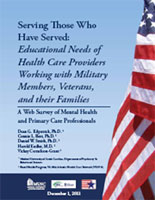Serving Those Who Have Served: Educational Needs of Health Care Providers Working with Military Members, Veterans, and their Families
Serving Those Who Have Served: Educational Needs of Health Care Providers Working with Military Members, Veterans, and their Families

>> Download (1 MB, PDF)
Serving Those Who Have Served: Educational Needs of Health Care Providers Working with Military Members, Veterans, and their Families is a web-based survey of rural and urban mental health and primary care community providers funded by the Office of Rural Health and carried out in partnership with the VISN 6 Mental Illness Research, Education and Clinical Center. This project was developed in partnership with Dean Kilpatrick and his team at MUSC.
Among the key findings of Serving Those Who Have Served are:
- 56% of community providers do not ask their patients about military service
- Only one in six community providers (16%) have served in the Armed Forces
- Although VA is a national leader in provider training, only one third (33%) of community providers trained in VA
- Only one out of eight (12%) have ever been employed as a VA health professional
- Community providers report less knowledge and confidence in treating PTSD, Traumatic Brain Injury (TBI) and substance abuse/dependence than in treating depression, suicide or family stress issues
- Rural Veterans are of particular concern since they comprise 41% of all enrolled in VA Health Care and 39% of enrolled OEF/OIF/OND Veterans3 yet Rural community providers face significant challenges in meeting deployment health needs:
- Rural community providers feel significantly less knowledgeable and confident than urban providers in treating depression (26% vs. 16%), substance abuse/dependence (26% vs. 15%), and suicide (37% vs. 24%)
- Rural providers are significantly less confident about treating PTSD than their urban counterparts (51% vs. 34%)
- Rural Service Members (including Guard and Reserve Members), Veterans and their family members are less likely to have access to a local mental health professional
- More than half of all respondents (58%) want to know more about eligibility requirements for VA care
- Only 29% of respondents agreed with the statement: "I am knowledgeable about how to refer a Veteran for medical or mental health care services at the VA"
- The largest group of providers (48%) reported "no hesitancy" about referring patients to VA health care yet the 34% percent who had neutral responses on this question points to an important opportunity for educational outreach. Providers with neutral opinions are providers who can be converted to advocates if provided with more information.
- Respondents desire information on how to become a TRICARE provider and work with TRICARE to maximize service and expedite processes
Among the key recommendations offered by this report are:
- Given the relatively low percentage of community providers with military or VA experience, provider training should focus on improving their understanding of military culture and VA programs
- Providers should be encouraged to include at least one screening question to be asked of every patient: "Have you or someone close to you served in the Armed Forces?" Training in efficient and sensitive ways to screen patients about their military service experience is needed.
- Information on federal, state
and community programs that provide additional, non-medical support for Service Members, Veterans and their families is needed
- DoD and VA have made great strides in transforming the quality of care provided to those who have served yet survey responses indicate that perceptions among community providers, rural and non-rural, may lag behind these significant enhancements:
- Providers lack, but need, information about VA and DoD healthcare systems, eligibility requirements and referral procedures
- There a clear need for DoD and VA to continue efforts to spread the word about research and clinical progress in deployment health among community providers and to map the steps by which Service Members and Veterans enter DoD/VA care
